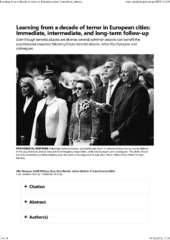Learning from a decade of terror in European cities: Immediate, intermediate, and long-term follow-up
Peer reviewed, Journal article
Published version

Åpne
Permanent lenke
https://hdl.handle.net/1956/23688Utgivelsesdato
2019Metadata
Vis full innførselSamlinger
Originalversjon
https://doi.org/10.15714/scandpsychol.6.e10Sammendrag
Over the last decade, a series of terrorist attacks has taken place in European cities. These attacks have varied in type and scope. This paper presents the lessons learned from the psychosocial response by professionals and representatives of those directly affected in eight terror-stricken cities. These professionals and representatives were gathered for a workshop to present and discuss their experiences. The unpredictability of the events and the sheer number of affected individuals made registration, coordination of services, and information provision difficult in the immediate phase. The transnational nature of the events (i.e., involving the citizens of several countries, with formal and informal helpers converging on the scene), added to the coordination problems. While crisis contingency plans were available for the immediate response, the intermediate and long-term responses were often less well planned for. Among the lessons learned was the importance of a clearly defined leadership and chain of command, with systems in place for early registration of those affected. Crisis contingency plans should be regularly exercised, including the psychosocial response. With the usually large number of people involved in such attacks, a huge need exists for information, especially for families in desperate need of information regarding their family members. Easily accessible, regular, updated, and verified information must be available for affected groups. Terror events demand good coordination and smooth exchange of information between different involved agencies. Systems must be in place to ensure coordination and collaboration as well as regulation and use of human and material resources. Several “hidden groups” such as bystanders, spontaneous helpers, and people who were inadvertently in contact with terrorists must be attended to. Peer support organisations represent a resource that can provide those in charge of psychosocial follow-up with an updated and realistic picture of people’s needs. It is also recommended that long-term follow-up is planned for in an early phase of psychological support, since a recurring problem has been a gap between the early response and the long-term follow-up.